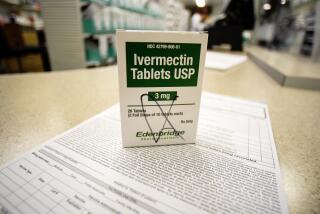Doctors Carrying AIDS Virus Stir Ethical Debate : Health: Some say it is vital that patients have the information. Others argue that proper precautions make mandatory disclosure unnecessary.
- Share via
Ten years into the AIDS epidemic, doctors carrying the human immunodeficiency virus that causes the disease remain under no legal obligation to tell their patients that they are infected--and ethicists have not settled the question of whether physicians have the moral obligation to do so.
One thing, however, seems certain: The ethical debate--if not the legal one--is bound to intensify as many doctors clamor for the right to learn if their patients are infected before performing surgery or other procedures that could expose them to contaminated blood or secretions.
“The issue of whether physicians have a duty to inform their patients is pretty well settled in the negative--there is no such duty. But I’m speaking as a lawyer,” said Michelle Oberman, who teaches at the Institute of Health Law at Loyola University in Chicago.
But speaking to the moral issue, she said: “The thing that troubles me is once doctors claim the right to know the status of their patients, don’t patients have the same right? In Illinois, you (doctors) have the legal right to know the status of people whose fluids you are exposed to.”
Robert M. Veatch, a professor of medical ethics at Georgetown University, said that the infected doctor’s obligation did not emerge as a big issue before U.S. newspapers carried a story this year about an infected dentist from Stuart, Fla., who apparently passed on the virus to a female patient.
The dentist died of AIDS on Sept. 3. The patient has since gone public with her story, making an emotional plea for a patient’s right to know before submitting to the care of an infected health care worker.
Veatch said he believes that a surgeon has an obligation to tell patients about any serious risk posed by surgery, however remote. That includes the small risk of transmission of AIDS if he cuts himself with his scalpel and spills blood onto the patient.
“My guess is that if we did a survey of surgery patients--would they want to know if a surgeon had AIDS before he operated--my guess is that the patients would be interested in that fact.
“My real comment is that a physician has a duty to tell patients about those things they would reasonably want to know before establishing a doctor-patient relationship or consenting to a procedure,” Veatch said.
Some ethicists, however, insist that the risks are too small to warrant any rules forcing doctors to disclose their infection.
“There’s a mythology about the communicability of HIV,” said Daniel McGuire, an ethics professor at Marquette University in Milwaukee, Wis. The risk, he said, of spreading the virus is extremely remote if surgeons wear masks, gloves and gowns and take other precautions suggested by the federal Centers for Disease Control.
McGuire said he believes that surgeons who take proper precautions are morally obligated to tell their patients only when the disease has reduced their ability to operate competently. At that point, he said, the risk of a surgical mishap heightens.
In the July 25 Journal of the American Medical Assn., University of Minnesota surgeon Frank S. Rhome wrote in an editorial that “there are probably hundreds of practicing surgeons in the United States who are practicing with (HIV).” But, while admitting that the risk of surgeon-to-patient transmission is impossible to measure, he put it at somewhere between one in 100,000 and one in 1 million.
The uncertain risks leave some ethicists befuddled.
“I think the surgeon could make a case for non-disclosure if they take proper precautions, recognizing that the possibility of transmitting the virus is so very, very remote,” said Dr. Stephen Post, assistant professor of medical ethics at Case Western Reserve University in Cleveland.
“On the other hand, surgery is such a distinctive practice in that it involves the possibility of a skin cut from the physician. . . . There’s no cookbook that answers this in a jiffy. I would be very hesitant to suggest that the (ethical) tradition suggests one answer over the other.”
The American College of Surgery, which sets standards for the profession, is considering guidelines both for the infected surgeon and for the healthy surgeon who is worried about risks posed by sick patients.
“If we develop some sort of statement, it’s probably going to have to be a two-way street,” spokeswoman Linn Meyer said. “Obviously, the issue with the dentists is going to bring some heat on the issue.”
More to Read
Sign up for Essential California
The most important California stories and recommendations in your inbox every morning.
You may occasionally receive promotional content from the Los Angeles Times.












